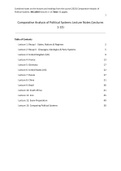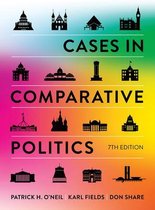Combined notes on the lectures and readings from the course (2022) Comparative Analysis of
Political Systems. INCLUDES lectures 1-13 (Total: 52 pages).
1
Comparative Analysis of Political Systems Lecture Notes (Lectures
1-13)
Table of Contents
Lecture 1: Recap I - States, Nations & Regimes 2
Lecture 2: Recap II - Cleavages, Ideologies & Party Systems 5
Lecture 3: United Kingdom (UK) 9
Lecture 4: France 13
Lecture 5: Germany 17
Lecture 6: United States (US) 22
Lecture 7: Russia 27
Lecture 8: China 31
Lecture 9: Brazil 36
Lecture 10: South Africa 41
Lecture 11: Iran 45
Lecture 12: Exam Preparation 49
Lecture 13: Comparing Political Systems 50
, 2
Lecture 1: Recap I - States, Nations & Regimes
Introduction to Comparative Politics
Major subfields of political science:
1. Public administration (administration + public policies in a state).
2. International relations (domestic + international comparisons).
3. Political theory/philosophy (less empirically about political systems, BUT engaging in how
they should work).
4. Comparative politics (domestic political phenomena across countries, NOT between these
countries → domestic is needed to reach international).
What to compare? How to compare? Why compare? Pitfalls of comparison
Looking at political Cases need to be Descriptively (gather Comparing cases requires a lot
structures, actors, similar enough to knowledge about other of background information.
processes. be comparable. countries + own country)
Different meanings of concepts
Look for similarities Analytically (create in different cultural/linguistic
+ differences based classifications + contexts (e.g., “liberal” used in
on criteria. typologies, formulate/test the US vs. Western Europe).
hypotheses + theories,
Pay attention to make semi-accurate Ethnocentrism/stereotypes →
different contexts. future predictions). ensuing bias.
States, Nations & Nationalism
Societies + political organisations have evolved:
● Tribes without rulers → tribes/communities with rulers → city-states → kingdoms/empires →
modern ‘Nation-States’:
○ 1648-1815 = conception.
○ 1815-1945 = consolidation.
○ 1945-present = erosion (loss of power to supranational actors, organisations).
State: Do NOT confuse country + government (currently governing the state).
➔ 3 features (German sociologist Max Weber):
1. Population (human community)
2. A territory.
3. Internal sovereignty (monopoly of force)
Codified in the Montevideo Convention (1933) = rights + duties of states, the addition of:
4. External sovereignty (international recognition).
➔ Colonialism exported these concepts of the ‘state’.
➔ Peculiarities challenging the idea of a ‘state’:
◆ Supranational organisations (e.g., EU) = associations of states (transfer of power
above the state).
◆ Non-sovereign territories (e.g., Greenland, Puerto Rico) = sub-state autonomy
(transfer of power below the state).
, 3
Partially recognised states De-facto states Failed states
Internal Sovereignty YES YES Little
External Sovereignty Contested Little YES
Examples Taiwan, Palestine Somaliland, TRNC Somalia, South Sudan
Nation: An “imagined community” claiming sovereignty over a territory (NOT imaginary, BUT
inter-subjective) → e.g., Netherlands = state, Dutch nation = nation.
➔ Nationalism: Ideology that contains a nation. Nationalist push tries to homogenise the
nation.
➔ Nation-State: Conception of 1 state = 1 nation.
◆ Initiated at the Treaty of Westphalia (1648) & French Revolution (1789).
◆ Consolidated at the Congress of Vienna (1815).
➔ Degree of consequences on a spectrum:
◆ State-nationalism (national level) = eradicating differences (e.g., Spain under
Francisco Franco).
◆ Multinationalism (mixed approach) = federalism (e.g., Belgium, Canada).
◆ Sub-state nationalism (sub-national level)= secession (break-off of a certain region).
➔ Do NOT confuse nationhood (sense of feeling, sociological) ≠ citizenship (legal question).
◆ Nationality depends on the context.
➔ Ethnicity: Social construction based on common descent + heritage, within or across states.
HOWEVER (difference with nation) it does NOT translate into a quest for political
sovereignty.
◆ Craig Calhoun (1993):
● Ethnicity overlaps/conflicts with the nation.
● Nationalism often has an ethnic foundation.
◆ E.g. Yugoslavia (1980s) = ethnicities precede the nation.
Did the state create the nation, or the nation the state?
● Different for each case (e.g., Germany = nation → state, France = state → nation).
● Depends on the nation’s foundation (ethnicity, language, religion, ideals/ideology).
● Determines the extent to which nations are ‘open’:
○ Civic nationalism = open.
○ Ethnic nationalism = closed (born, speak the language).
Regime & Regime Types
Political system = classified on particular features.
Regimes = NOT very specific but more to set to who governs (how).
● Aristotle’s typology:






